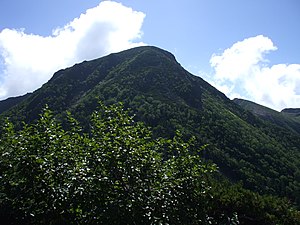Spirit away

In English, to "spirit away" means to remove without anyone's noticing.
In Japanese folklore, spiriting away (Japanese: Kamikakushi (神隠し), lit. 'hidden by kami') refers to the mysterious disappearance or death of a person, after they had angered the gods (kami). There are numerous legends of humans being abducted to the spirit world by kami. Folklorist Kunio Yanagita recorded several tales of kamikakushi in Tōno Monogatari (遠野物語, Tōno Tales, 1909).[1]
Modern fiction[]
In the 1820 short story The Legend of Sleepy Hollow, when the main character Ichabod Crane vanishes after being pursued by the Headless Horseman, he is rumored to have been spirited away by the specter.[2]
In Japan[]
In the anime film Spirited Away, the main protagonist, Chihiro, is "spirited away" from reality to the spirit world.[3] There, she meets friendly and aggressive spirits as she tries to return before forgetting her name.[4]
In the series Higurashi When They Cry one person dies and one disappears mysteriously every year in Hinamizawa village. This is known as "Oyashiro-sama's curse," named after the village kami Oyashiro.[5] The first arc of the series is called "Abducted by Demons".[6]
In the novel and manga Missing / Spirited Away by Gakuto Coda, the main character Utsume Kyoichi goes missing for a second time, in the company of his new spirit girlfriend Ayame.
In the manga Rin-ne by Rumiko Takahashi, heroine Sakura Mamiya disappeared for a week after being taken away by spirits, and she was brought back to this world by Rinne's grandmother Tamako. Sakura can't remember what exactly happened to her during these days, but as a consequence she gained spiritual powers that let her see ghosts, something that she wants to get rid of.
Kamikakushi is mentioned in a song "Madoite Kitare, Yuuda na Kamikakushi ~ Border of Death" by IOSYS. It refers to Yukari's mystic abilities.
In the video game series Fatal Frame many of the characters get spirited away[7][8] by ghosts often leading them into a spirit world where they use the Camera Obscura, an antique camera-like device that captures images of spirits to either find a way out or save someone who has been spirited away.[9]
In the Japanese classic film Goyokin by Hideo Gosha (starring Tatsuya Nakadai), kamikakushi is mentioned after the inhabitants of a small fishing village all mysteriously vanish.
See also[]
- Yama-bito
- Tengu
- Unexplained disappearances
- Metsänpeitto
- Ōkami Kakushi
- Rapture
References[]
- ^ Reider, Noriko T. (April 2005). "Spirited Away: Film of the Fantastic and Evolving Japanese Folk Symbols". Film Criticism. 23 (3): 4–27, 79. Retrieved 2 April 2020.
- ^ Irving, Washington (25 June 2008). The Legend of Sleepy Hollow. Urbana, Illinois: Project Gutenberg. Retrieved 6 April 2020.
The old country wives, however, who are the best judges of these matters, maintain to this day that Ichabod was spirited away by supernatural means...
- ^ Ebert, Roger (20 September 2002). "Spirited Away (review)". RogerEbert.com. Retrieved 7 April 2020.
- ^ "Spirited Away: Plot Overview". SparkNotes. SparkNotes LLC. Retrieved 7 April 2020.
- ^ Henley, James (8 September 2009). "Anime Reviews: Higurashi: When They Cry". The Escapist. Retrieved 7 April 2020.
- ^ "Higurashi WHEN THEY CRY". Yen Press. Retrieved 7 April 2020.
- ^ Fatal Frame (instruction manual) (NTSC, PS2 ed.). Tecmo. 2002.
Nine days have passed since Mafuyu, brother of Miku Hinasaki, had disappeared.
- ^ Fatal Frame II: Crimson Butterfly (instruction manual) (NTSC, PS2 ed.). Tecmo. 2003.
Many also say that, if you should happen to get lost in this forest, you will be spirited away to this lost village.
- ^ Brown, Andrew. "Scary Nintendo Memories: Fatal Frame". Nintendo World Report. NINWR, LLC. Retrieved 7 April 2020.
- Blacker, C. (1967). "Supernatural Abductions in Japanese Folklore". Asian Folklore Studies. 26 (2): 111–147. doi:10.2307/1177730. JSTOR 1177730.
- Staemmler, Birgit (2005). "Virtual Kamikakushi: An Element of Folk Belief in Changing Times and Media". Japanese Journal of Religious Studies. 32 (2): 341–352. JSTOR 30234067.
- Sadler, A. W. (1987). "The Spirit-Captives of Japan's North Country: Nineteenth Century Narratives of the "Kamikakushi"". Asian Folklore Studies. 46 (2): 217–226. doi:10.2307/1178585. JSTOR 1178585.
- Staemmler, Birgit (2009). Chinkon Kishin: Mediated Spirit Possession in Japanese New Religions. ISBN 9783825868994.
External links[]
 The dictionary definition of spirit away at Wiktionary
The dictionary definition of spirit away at Wiktionary
- Japanese folklore
- Japanese mythology stubs